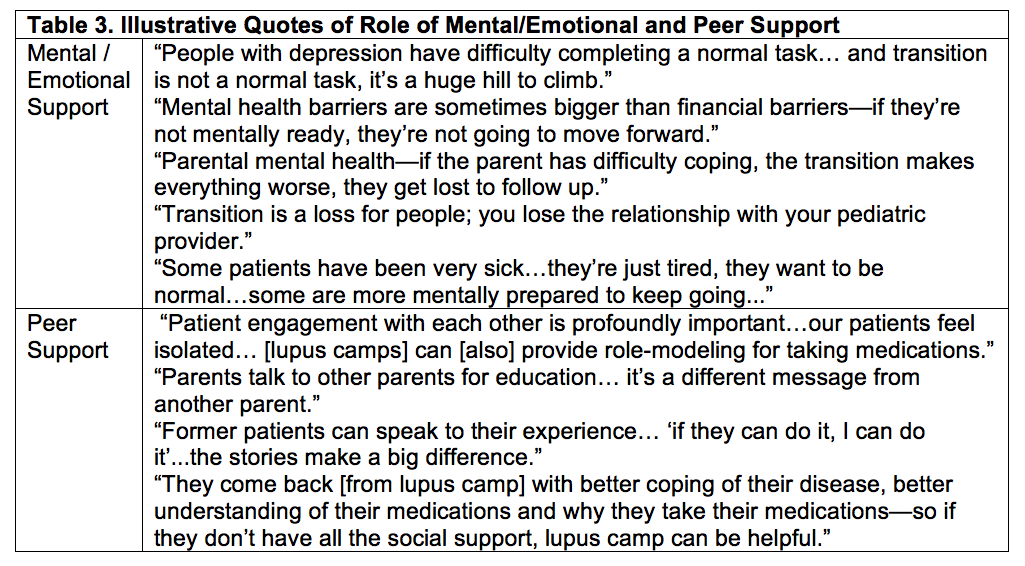Session Information
The 2020 Pediatric Rheumatology Symposium, originally scheduled for April 29 – May 2, was postponed due to COVID-19; therefore, abstracts were not presented as scheduled.
Date: Thursday, April 30, 2020
Title: Poster Session 1
Session Type: ACR Abstract Session
Session Time: 6:00PM-7:00PM
Background/Purpose: The transition from pediatric to adult care for youth with chronic disease is known to be a vulnerable period, with adverse outcomes described for patients with childhood-onset systemic lupus erythematous (cSLE) including gaps in care, unscheduled healthcare utilization, loss of insurance, high disease activity, and damage accrual. However, the psychosocial and logistical factors associated with optimal or poor transitions remain poorly understood. In this qualitative study, we explored beliefs and attitudes of members of the clinical team regarding the transition of patients with cSLE.
Methods: We conducted in-depth interviews (n=12) with members of the clinical team who care for patients with cSLE, both prior to and following transfer in one major metropolitan area (encompassing two pediatric clinical sites and three adult clinical sites). A semi-structured interview guide was used to prompt participants to discuss their perspectives on transition in five domains: health care system factors, role of family and social support, role of adverse life events and resilience, patient characteristics, and mental health. Audio recordings are in the process of being transcribed and analyzed using constant comparator analysis. Two team members, trained in qualitative methodology, collaboratively developed and are refining a coding dictionary using NVivo to manage data analysis. These results represent preliminary themes that are emerging from the interviews.
Results: We conducted 12 in-depth interviews. Participants included pediatric rheumatologists (n=4), adult rheumatologists, both academic (n=2) and private practice (n=1), nurses (n=2), a nurse practitioner, a social worker, and a psychologist. We identified several emergent themes in the data, namely the positive or negative impact of family on the transition process (Table 1), characteristics and coping mechanisms of patients who do well or who do poorly during transition (Table 2), and the role of mental, emotional, and peer support (Table 3). Similar themes emerged from both adult and pediatric clinical team members.
Conclusion: This study suggests that members of the clinical team who care for patients with cSLE, both prior to and following transfer, identify similar themes surrounding the importance of family involvement, patient-level characteristics and coping mechanisms, and the need for mental, emotional, and peer support. A better understanding of the psychosocial needs of this population will inform the development of multimodal interventions for high-risk patients who will transition to adult care. Additionally, these data will enable clinicians and researchers to gain insight into the potential psychosocial barriers that patients with childhood SLE face as they transition from pediatric to adult care.
To cite this abstract in AMA style:
Bitencourt N, Kramer J, Bermas B, Solow E, Wright T, Makris U. Clinical Team Perspectives on the Transition from Pediatric to Adult Care for Patients with Childhood-Onset SLE [abstract]. Arthritis Rheumatol. 2020; 72 (suppl 4). https://acrabstracts.org/abstract/clinical-team-perspectives-on-the-transition-from-pediatric-to-adult-care-for-patients-with-childhood-onset-sle/. Accessed .« Back to 2020 Pediatric Rheumatology Symposium
ACR Meeting Abstracts - https://acrabstracts.org/abstract/clinical-team-perspectives-on-the-transition-from-pediatric-to-adult-care-for-patients-with-childhood-onset-sle/



